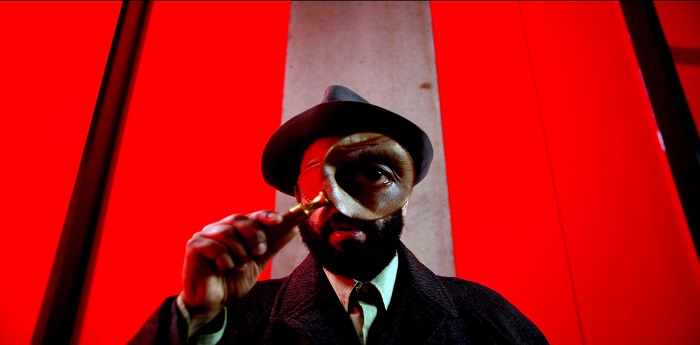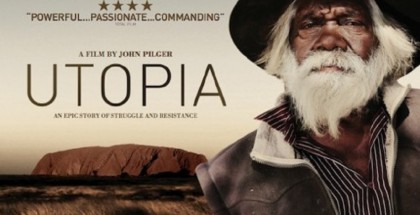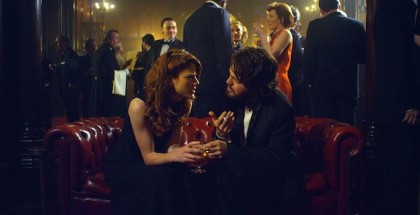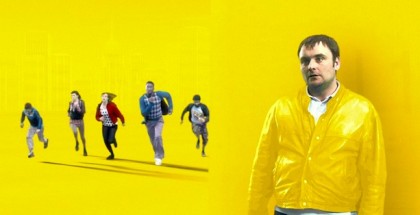UK TV review: Utopia Season 2
Review Overview
Style
9Substance
9David Farnor | On 14, Aug 2014
This contains spoilers for Season 1 of Utopia and mild spoilers for Season 2. Not caught up? See our spoiler-free review here.
“If you really wanted to save the environment, you wouldn’t have had that child,” grins a sinister fellow at a coach station to an unsuspecting mother.
His cruel lecture delivers the two central truths of Utopia: 1. Whenever someone or something appears to be happy, the situation will immediately turn bad, and 2. Humans are selfish, a trait that assures their own destruction.
It’s nothing new to those who saw the first season, a shockingly original conspiracy thriller that essentially outlined why mankind is screwed – because there’s too ruddy much of it. That’s not fiction: it’s a fact. As of this month, we’ve already used up the planet’s resources for this year. Which is why The Network engineered a virus, Janus, to sterilise 90% of the population and ensure the survival of the rest. The plan? Create a global pandemic and sneak Janus into the antidote.
Season 1 of Dennis Kelly’s show unsettled by uncovering The Network’s conspiracy and revealing it to be ultimately unstoppable. Season 2 does something even more disturbing: it lets the conspiracy play out. Gone is the theory and its threatening potential; here it is in bloody, chaotic practice.
The season begins with a flashback to the 1970s, when Network chief Mr. Rabbit and eager scientist Philip Carvel spend their evenings secretly discussing the moral dilemma at hand. The prologue, which casts Game of Thrones’ Rose Leslie as a young Milner and Tom Burke as a young Carvel, is a bold, indulgent opening, one that recaps the first season for newcomers and immediately reminds old viewers how violent Utopia can be. But it also sows the seeds for the six-episode sequel, giving us an insight into Carvel and Milner’s relationship – and, crucially, an emotional stake in their whole plot.
Carvel becomes an increasingly big part of the series, not only in terms of the Janus virus – which Ian, Becky and Grant are still trying to stop – but also his lasting effect upon Milner. For the first time, Geraldine James’ ruthless spook has a hint of compassion, one that adds even more complexity to The Network’s conspiracy. If before, Janus seemed scarily logical, now it feels sympathetically justified, as Dennis Kelly’s devilishly ambiguous script pulls the rug out from under your heartstrings.
That emotional engagement applies to all of the cast, from Nathan Stewart-Jarrett’s earnest Ian, yearning after Alexandra Roach’s foul-mouthed Welshy, to Fiona O’Shaughnessy’s eerily detached Jessica Hyde (Carvel’s daughter and a carrier of the Janus virus).
The most interesting character, though, is reformed assassin Arby. Neil Maskell’s creepy killer (and Carvel’s son) finds himself swapping guns for stuffed toys as he shuffles through everyday life, his blank face now showing endearing signs of expression. He even grows an angst beard to show his inner turmoil.
That unsubtle symbolism is the perfect fit for Utopia’s comic book-tinged world. Ole Bratt Birkeland’s cinematography continues to be a central part of the series’ unique themes, singling out villains with almost cartoon-like colours, from the banana suit worn by Paul Ready’s softly-spoken (scene-stealing) psychopath to the neon bars of the prison used to hold Jessica captive. All of it contrasts with the crimson bursts of blood that repeatedly splatter the frames.
Nowhere is the relationship between style and substance better shown than by Wilson Wilson. After his betrayal in Season 1, Wilson’s path is smartly juxtaposed with Arby’s redemption, as the hacker sinks deeper into The Network’s web. Once a victim of their torture, he now covers his missing eye with a rusty patch, swapping his shabby clothes for a brightly coloured shirt and suit. Red, you sense, is the new yellow.
Wilson’s increasingly garish appearance offsets Adeel Akhtar’s mild-mannered voice, the epitome of Utopia’s paradoxical tone, which perches on a knife edge between stereotypical British politeness and unflinching brutality. A mix of harsh truths and satirical surface, it’s like watching the demonic lovechild of Alan Moore and Chris Morris.
Some characters land a smaller punch than others, with Oliver Woollford’s Grant not always given the space to explore his position on the blade, but Kelly’s concise scripts and Cristobal Tapia de Veer’s increasingly complex soundtrack maintain the programme’s relentless, gripping pace.
As the plot unfolds, a mess of incompetent politicians (the wonderfully bumbling Paul Higgins) and endless back-up plans, Kelly’s series reveals just how rare it is to see a conspiracy in action. The Network, once an omnipresent force, begins to appear shaky, as individual people begin to take stock of exactly what they are doing. Happiness, though, is not the show’s aim: as our coach station tormentor proves at the climax of Episode 6, things always slip down the wrong side of the knife, no matter how jolly they seem. Not because people are nasty (Utopia is too subtle for that), but precisely the opposite: humans love humans, from Milner and Carvel through to Jessica and Arby. And that selfish desire to be with those we care about can override the most carefully-laid plans – or the most daringly-led rebellions. Once again, the show takes us back to square one, in a sense, confronting the grim truth of our race with only ourselves to blame. Utopia Season 1 was one of the best British series of recent years. Utopia Season 2 is not just harrowing viewing: it’s vital television.
If Utopia used to be a bitterly sarcastic title, a jab at the inevitability of our doomed world, here the word takes on a faintly tragic irony: as soon as someone tries to make Utopia a reality, that potential is undermined by their own nature. Conspiracy theories are scary things. Conspiracies in practice are even scarier.
Utopia is available on BritBox, as part of a £5.99 monthly subscription.






















